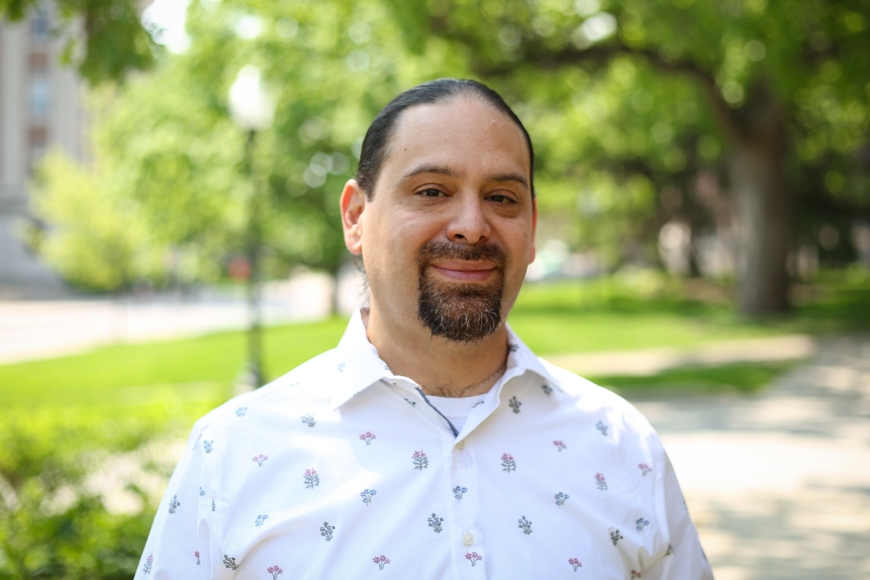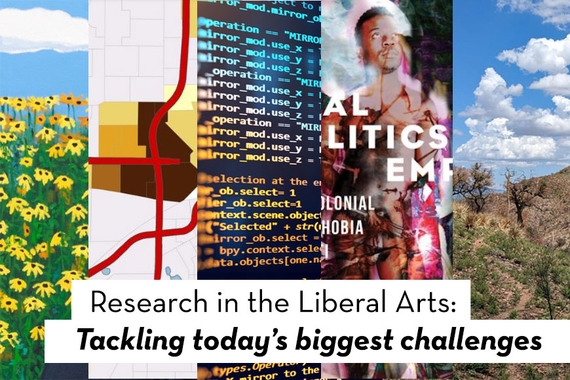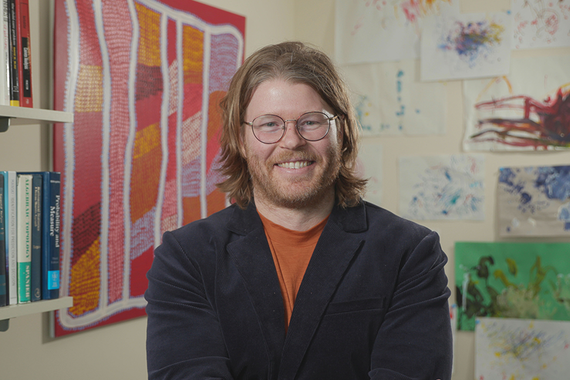Jimmy Patiño on the Transformative Power of Collective Action
How can solidarity be built through differences? This question is the beating heart behind much of Jimmy Patiño’s work. Patiño, associate professor in the Department of Chicano & Latino Studies, has taught at the University of Minnesota since 2011. He is the new director of the Center for Race, Indigeneity, Disability, Gender & Sexuality Studies (RIDGS) after serving as associate director for the last two years.
Throughout his time here, Patiño has found both a community and a home and has had the opportunity to meet people equally as compelled by issues of social justice as himself. A historian by training, much of Patiño’s research focuses on looking to the past to improve the present. By examining the history of the civil rights movement and other radical movements for social justice, he seeks to understand the solidarity that brings diverse communities together. Within this framework, Patiño emphasizes the transformative power of collective action in the fight for equality.
The Power of Connection
Patiño juggles many responsibilities within the Chicano & Latino studies department, from teaching and supporting students to making decisions about the curriculum. “One of our goals is to work with the community,” Patiño mentions, recalling a guest speaker he’d hosted in one of his classes earlier that day to talk about the Guatemalan diaspora in Minnesota. The department’s outreach coordinator, Lisa Sass Zaragoza, is a key partner in connecting department members and their teaching and research with Latino community leaders.
Similarly, Patiño’s work in RIDGS includes connecting students with people who can help them with their goals, both academically and professionally. “RIDGS is a coalition of the ethnic studies, disabilities studies, and gender studies programs and departments,” he explains. “We seek to work together as autonomous but interrelated units.”
This coalition, formerly known as the RIGS Initiative, has been making a difference for the past decade. In 2015, the RIGS Initiative partnered with student activist groups to advocate for investment in the units that specialized in race, indigeneity, gender, and sexuality studies—resulting in four faculty hires. That made a big difference to Patiño, the only fully rostered faculty member in his department at the time. And it’s not just about hiring; RIDGS invests in faculty in these fields, such as through the Ruby Pernell Fund for Faculty Retention, and works to make the college a more inclusive place to study and work. More recently, RIDGS supported the Disability Studies Initiative's move to become a formal program and collaborated on a statement of support for the student activists protesting the violence in Gaza.
Patiño emphasizes the need for critical fields that address social justice issues to have space where they can lean on each other. “Sometimes ethnic studies is not seen as valuable because it is politicized,” he says. So, the programs come together to advocate and ensure they’re being resourced and supported. “It’s a little less exhausting to do it as a team than as individuals.”
Building Solidarity Through Differences
While finding similarities is quite valuable, Patiño is interested in finding common ground through differences. With his emphasis on remembering the past, Patiño understands the importance of honoring what makes different groups unique and finding a way to come together while still maintaining one’s individuality. “The different departments want to work together,” he remarks, “but we also want to keep the integrity of our specific fields of studies, and our histories and our communities.”
Patiño’s current research centers on radical social justice groups and specific moments in history where solidarity was built across differences, particularly across different ethnic groups. Patiño looks at groups and movements like Black Power, the Chicano Movement, and Mexican immigrants, among others. He focuses on the 1960s, which saw a decline of this solidarity as certain practices meant to impede and demobilize, such as mass incarceration, arose. Today, Patiño aims to understand how to recreate and maintain this solidarity in the face of persistent systemic issues.
The Ties That Bind Us
What inspires this work? “I’m really inspired by finding these folks from the past who already had this nuanced understanding of what was wrong with society so that we can improve it,” Patiño says.
Patiño’s focus on solidarity and connection goes beyond his research and into his classroom, where he finds further inspiration in his students. “My students are fantastic in terms of their enthusiasm and desire to understand what’s wrong with society, and how critical they are of our leaders,” he says. “Some of the most engaged are Black and Brown women and I am inspired and proud that they’re taking leadership in the classroom. They’re taking ownership of the classroom as a place where they want to learn how things work, how they are connected to their communities and how to make things better.”
Patiño has recently worked closely with curator James Curry to create an exhibit based on Patiño’s research on Black, Brown, & Red Power in the Minnesota African American Heritage Museum & Gallery, on view through August 8.
This story was written by Regina Ramos-Francia Ylizaliturri, an undergraduate student in CLA.



